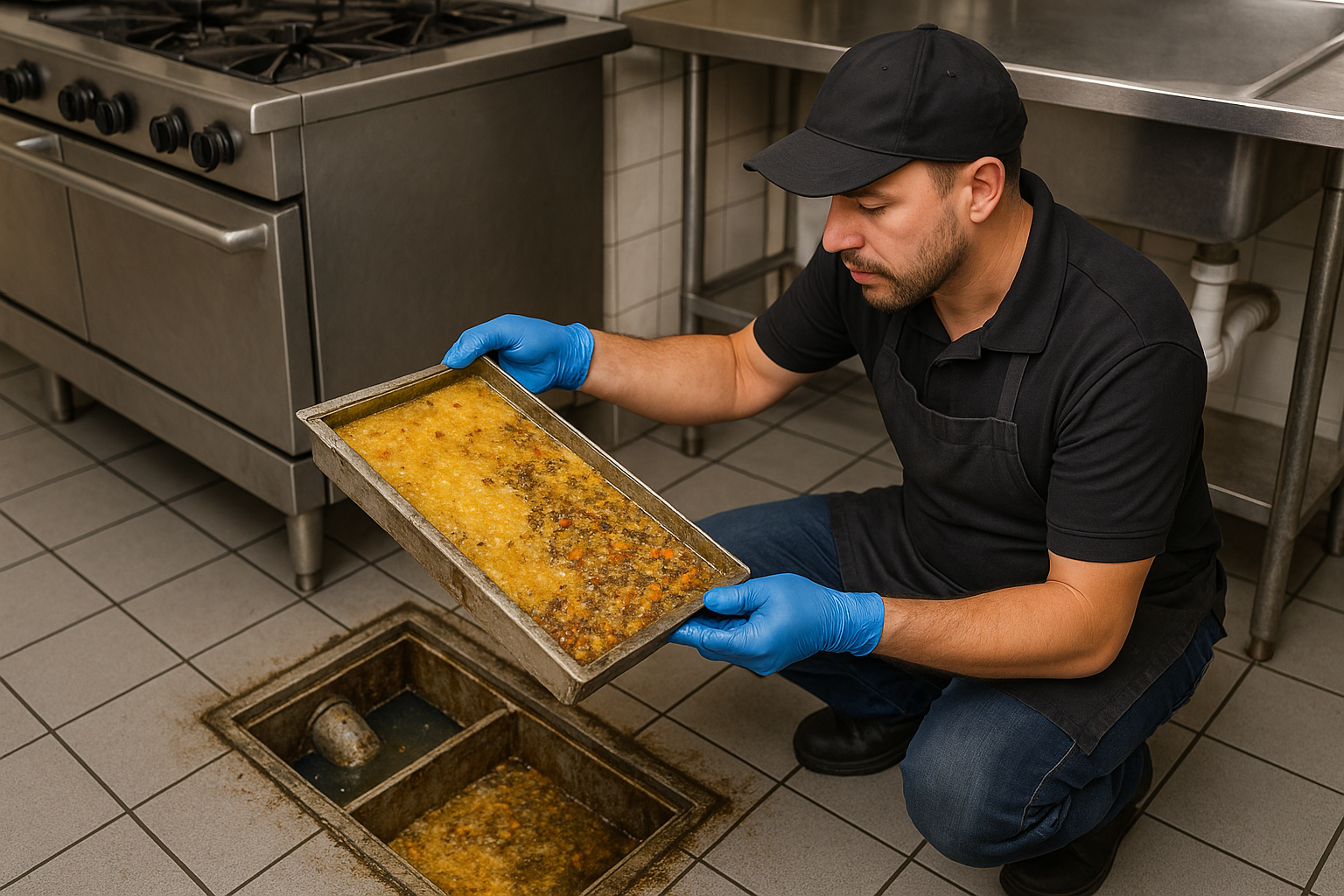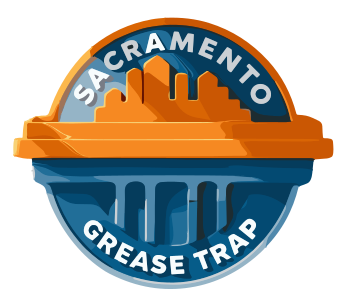How Often Should You Clean a Grease Trap?

Why Knowing How Often to Clean a Grease Trap Matters
If you’ve ever dealt with slow drains, lingering odors, or last-minute shutdowns during a dinner rush, you already understand how disruptive grease trap issues can be. Most Sacramento restaurant owners face the same puzzle: figuring out how often to clean grease trap systems in a way that keeps them compliant without overspending. It’s a balancing act that affects customer experience, health inspections, and day-to-day workflow.
Grease traps naturally collect fats, oils, and grease, so determining the right timing isn’t always straightforward. Overdue service risks backups, fines, and expensive repairs. Cleaning too often drains time and budget. This is where smart grease trap maintenance becomes essential.
In this guide, you’ll learn the ideal schedule, early warning signs, and how Sacramento businesses can stay compliant with local rules. If you want a deeper technical overview, our internal guide explains the fundamentals here: grease trap basics. By the end, you’ll have a clear plan for keeping your trap efficient, safe, and fully compliant.
Why Regular Grease Trap Cleaning Matters
Understanding how often should you clean a grease trap starts with knowing why regular maintenance is such a big deal. When fats and oils cool and solidify, they restrict water flow and create stubborn blockages. Consistent service helps prevent plumbing emergencies, keeps odors out of customer spaces, and aligns your operation with Sacramento’s wastewater rules.
A reliable cleaning schedule helps you stay compliant, reduce unexpected expenses, and avoid emergency calls that disrupt service. Many owners assume cleaning is only necessary when backups appear, but once symptoms are noticeable, the trap is already overdue. Since under-sink traps, in-ground interceptors, and larger external systems fill at different rates, scheduled grease trap cleaning becomes crucial.
Sacramento’s FOG regulations are strict, making proactive maintenance essential. Once you understand how much waste your kitchen produces, determining the right cleaning interval becomes much easier.
How Often Should You Clean Your Grease Trap?
Understanding Filling Rates for Grease Traps
Most Sacramento restaurants use the “25 percent rule”: when a trap is one-quarter full of grease and solids, it must be cleaned. At this point, the system becomes far less effective. Fill rates vary depending on your menu, cooking volume, and trap size, so routine tracking helps you establish a reliable pattern. Regular reviews also support consistent grease trap cleaning and long-term plumbing health.
Identifying Early Warning Signs of Overflow
Even with a schedule in place, early detection helps prevent emergencies. Slow drainage, strong odors, or grease surfacing in sink areas are red flags. Some kitchens rely on visual checks alone, but subtle issues often appear before visible buildup. Training staff to recognize changes in flow or smell ensures smoother kitchen operations and reduces the need for emergency grease trap pumping.
Following Local Sacramento FOG Regulations
Sacramento requires strict adherence to grease trap standards to protect the sewer system. Routine pumping, documented logs, and compliance with the 25 percent rule are all expected. Failing to follow guidelines can result in fines or mandatory corrective actions. Articles on Forbes also highlight the importance of wastewater compliance for business longevity.
Evaluating Food Volume and Menu Type
Your menu greatly affects trap fill rate. Establishments using heavy oils, fryers, or high-fat ingredients need more frequent restaurant grease trap cleaning. Kitchens with lighter menus may extend intervals. Tracking the impact of your menu on FOG levels gives you a realistic cleaning schedule that avoids both overcleaning and costly backups.
Establishing a Reliable Cleaning Schedule
Most Sacramento restaurants clean their traps every one to three months. High-volume kitchens or small under-sink traps may need monthly service, while larger interceptors often require quarterly pumping. Starting with monthly checks and adjusting based on fill levels eliminates guesswork. Internal service details can be found here: service information.
Practical Grease Trap Use Cases in Sacramento
Once you understand filling patterns, it becomes easier to tailor your approach. A small fast-casual restaurant in Midtown, for example, realized frying batches of food increased FOG output faster than expected. By switching from quarterly to bi-monthly service, they eliminated odor complaints and reduced backups entirely.
Another example involves a large commercial kitchen downtown. After implementing staff training on proper disposal, they reduced their grease trap fill rate by nearly 30 percent, allowing them to extend cleaning intervals without breaking compliance rules. Even food trucks have found value in routine inspections during busy months.
These examples show how adapting cleaning frequency to real-world conditions improves operations and prevents unnecessary sanitation issues.
Best Practices to Keep Your Grease Trap Clean Longer
Once your cleaning cycle is set, best practices help slow the buildup process and reduce maintenance costs.
• Train staff on proper disposal so large particles and oils don’t end up in the trap.
• Add strainers or mesh screens to sink drains to keep solids out.
• Avoid harsh chemicals that can damage the trap and push grease deeper into lines.
• Schedule monthly inspections to track how quickly your trap fills.
Small changes in workflow help preserve your system and improve results from your grease trap cleaning services provider.
Keeping Your Grease Trap on Schedule
Understanding how often to clean your grease trap gives you the confidence to manage your kitchen efficiently. With the right schedule, you can prevent backups, reduce odors, and stay fully compliant with Sacramento’s rules. Monitoring fill levels, adjusting for food volume, and following simple best practices will extend the life of your system.
When you need dependable professional service, partnering with experts familiar with local requirements can help maintain compliance year-round. For more details on routine pumping, visit: pumping service information.
FAQs About Grease Trap Cleaning
How often should a restaurant clean a grease trap?
Most restaurants clean their traps every one to three months depending on trap size and food volume. High-grease kitchens may require more frequent grease interceptor cleaning. Using the 25 percent rule is the most reliable way to stay compliant.
What are signs a grease trap needs cleaning?
Slow drainage, foul odors, visible grease, and gurgling noises in sink lines are strong indicators. If a trap is more than 25 percent full, it’s overdue.
Can grease traps overflow if not cleaned regularly?
Yes. Overflow allows fats, oils, and grease into plumbing lines, causing blockages and possible sewer damage. Overflow also increases the risk of fines and violations during inspections.
Do small under-sink grease traps need more frequent cleaning?
Because of their smaller capacity, under-sink traps fill quickly. Many require monthly service. Tracking fill levels helps determine a realistic cleaning cycle.
Are there laws in Sacramento about grease trap cleaning?
Yes. Sacramento enforces strict FOG regulations requiring proper maintenance, pump-out records, and compliance with the 25 percent rule. Staying aligned with these rules helps ensure smooth operations and successful inspections.

Let Us Simplify Your Grease Trap Maintenance.
Proper grease trap maintenance will reduce costly repairs in the future.
.avif)

